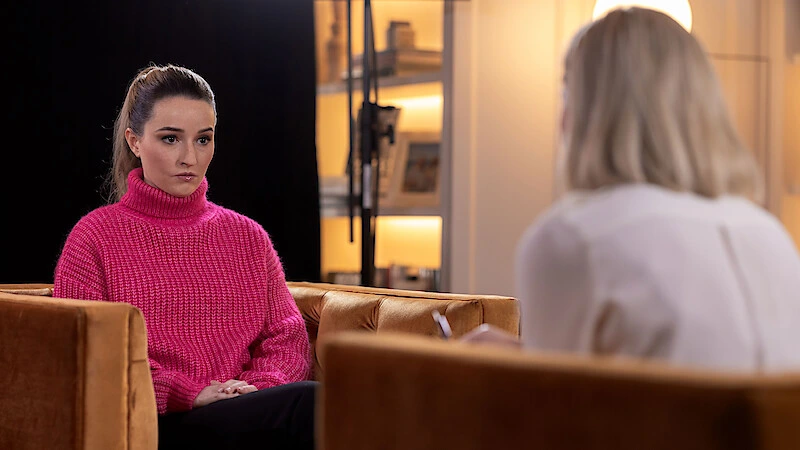NEWS
The Truth Behind Netflix’s ‘Apple Cider Vinegar’ Fraud
Annabelle “Beauty” Gibson rose to online entertainment popularity by guaranteeing she had tracked down a characteristic method for dealing with her terminal malignant growth. In 2013, she took to Instagram, expressing, “I have been mending an extreme and threatening mind disease for the beyond couple of years with regular medication, Gerson treatment, and food sources.” Her story appeared to be wonderful — getting through years in the wake of being given just months to live. Notwithstanding, it was subsequently uncovered as a deception intended to move her health domain, which incorporated a cookbook, “The Entire Storage room,” and a wellbeing application.
Her deceitful cases and the harm they caused have now roused the Netflix restricted series “Apple Juice Vinegar.” Made by Samantha Strauss, the six-episode series digs into the universe of health misrepresentation and duplicity. Strauss initial experienced Gibson through a 2015 “an hour Australia” interview, where writer Tara Brown begged Gibson to come clean. Strauss was struck by how Gibson seemed reluctant to confess to her misleading, in spite of overpowering proof.
The series clarifies that while it is roused by genuine occasions, it contains fictionalized characters and occasions, and the genuine Beauty Gibson was not made up for her story. One of the focal figures, Milla Blake (played by Alycia Debnam-Carey), is a virtual entertainment force to be reckoned with who acquires popularity and monetary accomplishment by sharing her experience of treating malignant growth normally. Milla’s story mirrors parts of Jessica Ainscough’s life. Ainscough, an Australian blogger known as the “Wellbeing Champion,” was determined to have epithelioid sarcoma in 2008 at 22 years old. After a flopped high-portion chemotherapy therapy, she denied further ordinary clinical mediations and went to Gerson Treatment. She died in 2015 at 29 years old.
Strauss underlines that Milla is a composite person roused by numerous genuine figures as opposed to an immediate portrayal of Ainscough. Another fictitious person, Lucy (Tilda Cobham-Hervey), has metastatic bosom disease and fills in as a sign of this present reality outcomes of Gibson’s duplicity.
One especially disrupting scene in “Apple Juice Vinegar” shows Beauty taking her child to a supposed specialist rehearsing in a distribution center. This specialist looks at Beauty utilizing informal strategies, claims she has “bunch” and “DNA harm” in her liver, and sells her a $10,000 machine that evidently forestalls cancer development. The scene is shockingly like a record Gibson partook in her 2015 “an hour Australia” interview, where she reviewed a specialist utilizing a machine with blazing lights that evidently recognized her mind growth through recurrence examination.
The writers who aided uncover Gibson’s extortion, Scratch Toscano and Playmate Donelly, got a tip in 2015 that she may be deluding people in general. After exploring, they found that numerous causes Gibson professed to have upheld had never gotten any gifts. This disclosure prompted a significant report. “Apple Juice Vinegar” depicts two columnists, Justin (Imprint Coles Smith) and Sean (Richard Davies), researching Gibson. In the show, Justin is hitched to Lucy, who urges him to dig further into Beauty’s cases.
Toscano and Donelly later chronicled Gibson’s misleading in their book, “The One Who Tricked the World.” That’s what they revealed, as charges against her mounted, Gibson madly reached causes, sent created verification of gifts, and accused “income issues” for the missing assets.
In “Apple Juice Vinegar,” Beauty fund-raises for a young fellow named Tracker, guaranteeing she will assist with subsidizing his cerebrum growth medical procedure. Notwithstanding, Tracker’s family never sees a penny of the gifts. This storyline intently looks like Gibson’s genuine gathering pledges for Joshua Schwarz, a kid determined to have terminal mind malignant growth in 2013 at age five. In 2015, The Messenger Sun revealed that Schwarz’s folks knew nothing about Gibson’s raising money endeavors and had never gotten any monetary help from her.
Perhaps of the most emotional second in the series finale is Beauty’s interruption at Milla’s burial service. She shows up after the expected time, drawing consideration with her overstated wailing, disturbing the grievers’ melancholy. As indicated by Toscano and Donelly’s book, Gibson acted in much the same way at Jessica Ainscough’s burial service. Witnesses reviewed her crying wildly, apparently attempting to show up more crushed than any other individual, in spite of scarcely knowing Ainscough by and by. Her exorbitant showcase of feeling left participants awkward and doubtful of her earnestness.
Netflix’s “Apple Juice Vinegar” focuses on the risks of wellbeing misrepresentation and the overwhelming effect of powerhouses who spread clinical falsehood. While the series fictionalizes a few parts of Beauty Gibson’s story, its center message stays clear: tricky wellbeing cases can hurt genuine. By sensationalizing this outrage, “Apple Juice Vinegar” fills in as a useful example about the outcomes of deceitfulness in the health business.